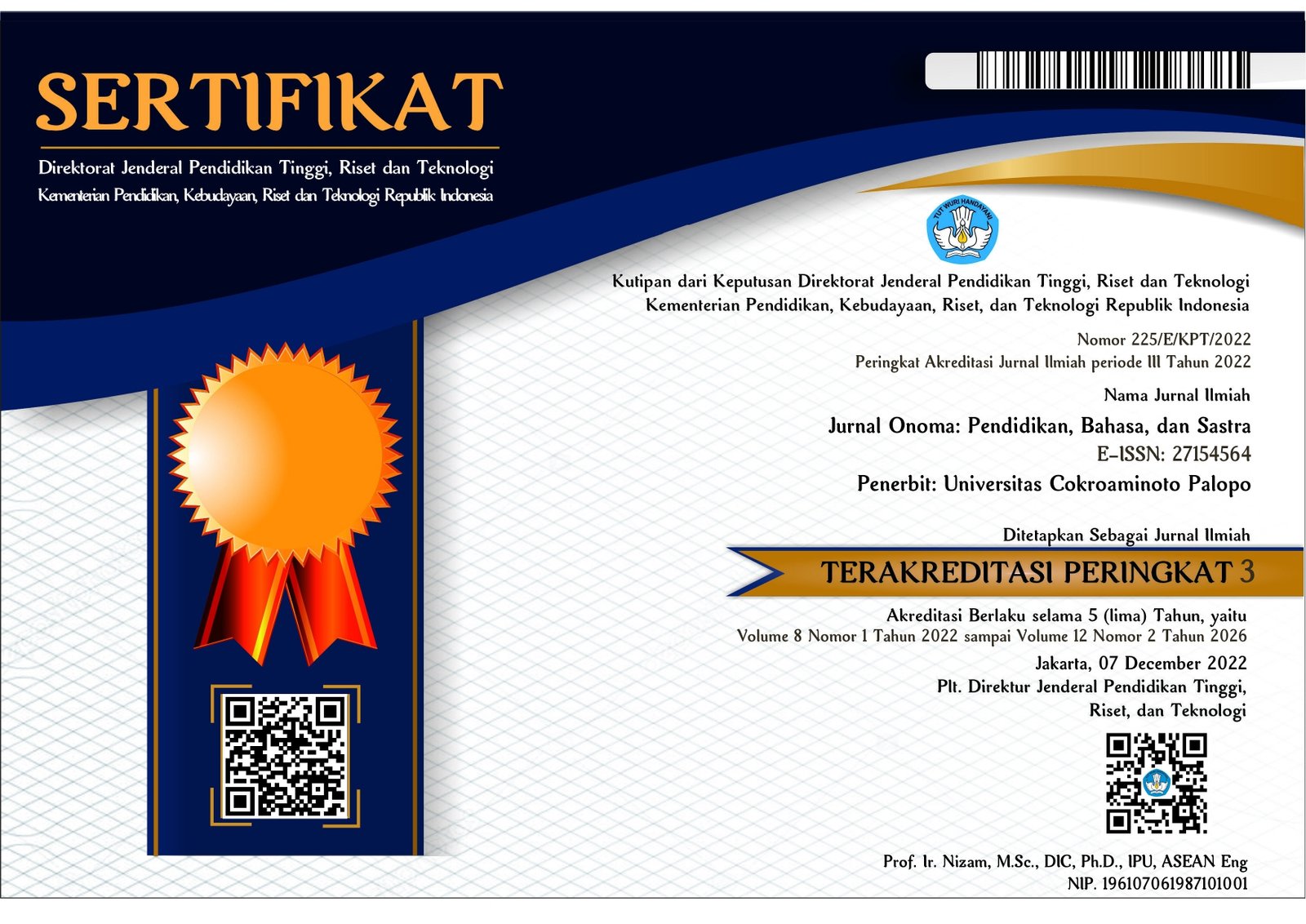Meningkatkan Kemampuan Menulis Teks Laporan Hasil Observasi pada Peserta Didik Kelas VIII-6 di SMPN 23 Kota Malang melalui Pendekatan Gamifikasi
https://doi.org/10.30605/onoma.v11i1.4870
Keywords:
pendekatan gamifikasi, menulis, teks LHOAbstract
Tujuan dari penelitian ini adalah untuk menganalisis bagaimana pendekatan gamifikasi dipakai untuk membantu siswa kelas VIII–6 SMPN 23 Kota Malang menulis teks Laporan Hasil Observasi (LHO) yang lebih baik. Kemampuan menulis peserta didik di SMPN 23 Kota Malang untuk teks laporan observasi masih kurang. Tidak ada latihan yang mendorong peserta didik untuk mengambil pendekatan yang lebih antusias dalam belajar menulis. Bahkan hingga saat ini, peserta didik masih kesulitan mengartikulasikan apa yang harus ditulis. Selain itu, peserta didik sering kali tidak tahu harus mulai dari mana saat menulis teks Laporan Hasil Observasi . Penelitian ini memakai metodologi Penelitian Tindakan Kelas (PTK) berdasarkan paradigma Robyn McTaggart dan Stephen Kemmis. Empat tahap utama pendekatan ini adalah perencanaan, pelaksanaan tindakan, observasi, dan refleksi. Siswa kelas VIII–6 SMPN 23 Kota Malang berjumlah 32 orang yang dijadikan sebagai subjek penelitian. Ujian keterampilan menulis teks observasi berfungsi sebagai instrumen penelitian. Penggunaan pendekatan gamifikasi dalam pembelajaran menulis teks laporan observasi di SMPN 23 Kota Malang dilaksanakan dalam dua siklus. Dari siklus 1 hingga siklus 2 siswa SMPN 23 Kota Malang mampu membuat teks Laporan Hasil Observasi setelah diajar memakai teknik gamifikasi. Mereka mencapai ketuntasan belajar 100% dengan kategori sangat baik sekali.
Downloads
References
Figueroa Flores, J. F. 2015. “Using Gamification To Enhance Second Language Learning”. Digital Education Review. Number 27:32-54.
Ling, L. L., Muna, W., & Wan, R. (2024). “Amalan Gamifikasi Melalui Pengajaran Penulisan Karangan Bahasa Melayu Dalam Kalangan Guru Di Sekolah Jenis Kebangsaan Cina”. Jurnal Dunia Pendidikan, 6(1), 1–13. https://doi.org/10.55057/jdpd.2024.6.1.1 DOI: https://doi.org/10.55057/jdpd.2024.6.1.1
Lubis, F. W., Turnip, B. R., dan Saragih, R. (2022). “Pengaruh Media Gambar Berseri terhadap Kemampuan Menulis Cerpen”. Jurnal Bastara Vol. 7 (1) DOI: https://doi.org/10.31604/linguistik.v7i1.83-90
Prihantoro, A., & Hidayat, F. (2019). “Melakukan Penelitian Tindakan Kelas”. Ulumuddin : Jurnal Ilmu-Ilmu Keislaman, 9(1), 49–60. https://doi.org/10.47200/ulumuddin.v9i1.283 DOI: https://doi.org/10.47200/ulumuddin.v9i1.283
Putri, Astri Lidia dkk. (2021). “Kemampuan Menulis Teks Laporan Hasil Observasi Pada Siswa Kelas X SMK Negeri 3 Seluma”. Jurnal Ilmiah Korpus Vol. 5 (1). DOI: https://doi.org/10.33369/jik.v5i1.13449
Srimulyani. (2023). “Menggunakan Teknik Gamifikasi untuk Meningkatkan Pembelajaran dan Keterlibatan Siswa di Kelas.” EDUCARE : Jurnal Pendidikan dan Kesehatan. Educare, 1(1), 30. DOI: https://doi.org/10.69743/edumedia.v1i1.6
Suyatun. (2021). “Peningkatan Kemampuan Menulis Cerpen Dengan Penerapan Pembelajaran Langsung Pada Siswa Kelas IX Melalui Model Latar Dan Alur”. Jurnal Inovasi Pendidikan Bahasa dan Sastra Vol 1 (2). DOI: https://doi.org/10.51878/language.v1i2.698
Syahputra, Donny dan Sri Ulina Beru Ginting. (2020). “Kemampuan Menulis Teks Anekdot Dengan Menggunakan Model Pembelajaran Write Arround Pada Siswa Kelas X SMK Putra Jaya Stabat”. Jurnal Serunai Bahasa Indonesia Vol 17 (2) DOI: https://doi.org/10.37755/jsbi.v17i2.318
Tarigan, Henry Guntur. (2017). “Menulis Sebagai Suatu Keterampilan Berbahasa”. Bandung : Angkasa.
Downloads
Published
How to Cite
License
In submitting the manuscript to the journal, the authors certify that:
- They are authorized by their co-authors to enter into these arrangements.
- The work described has not been formally published before, except in the form of an abstract or as part of a published lecture, review, thesis, or overlay journal.
- That it is not under consideration for publication elsewhere,
- That its publication has been approved by all the author(s) and by the responsible authorities – tacitly or explicitly – of the institutes where the work has been carried out.
- They secure the right to reproduce any material that has already been published or copyrighted elsewhere.
- They agree to the following license and copyright agreement.
License and Copyright Agreement
Authors who publish with Onoma Journal: Education, Languages??, and Literature agree to the following terms:
- Authors retain copyright and grant the journal right of first publication with the work simultaneously licensed under Creative Commons Attribution License (CC BY 4.0) that allows others to share the work with an acknowledgment of the work's authorship and initial publication in this journal.
- Authors are able to enter into separate, additional contractual arrangements for the non-exclusive distribution of the journal's published version of the work (e.g., post it to an institutional repository or publish it in a book), with an acknowledgment of its initial publication in this journal.
- Authors are permitted and encouraged to post their work online (e.g., in institutional repositories or on their website) prior to and during the submission process, as it can lead to productive exchanges, as well as earlier and greater citation of published work.

















